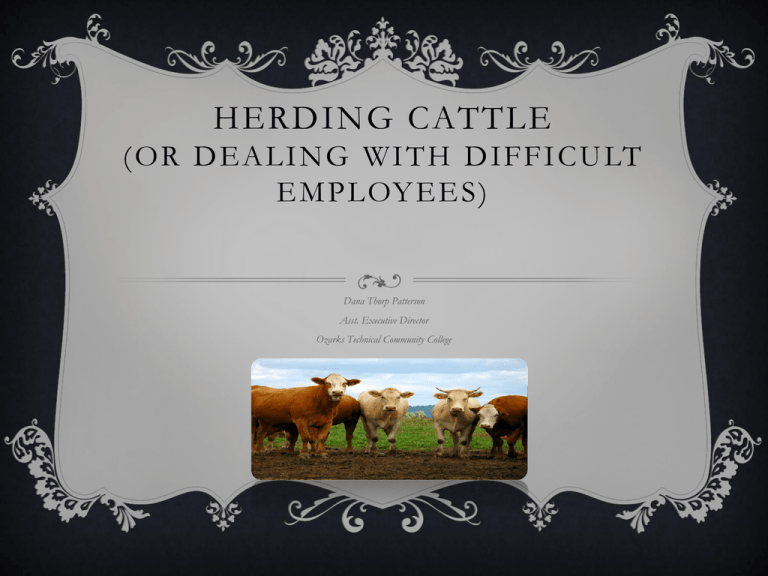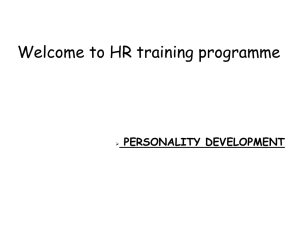Herding Cattle (or Dealing with Difficult Employees)
advertisement

HERDING CATTLE ( O R D E A L I N G W I T H D I F F I C U LT E M P L OY E E S ) Dana Thorp Patterson Asst. Executive Director Ozarks Technical Community College TODAY’S AGENDA Motivation Common Denominators Defining difficult people/behaviors Personality, Growth Plan, Action Plans MOTIVATION Basic Needs (Dr. Abraham Maslow) Physiological Safety & Security Social Needs Esteem or Ego Needs Self Actualization KNOWING YOUR STAFF Money is a bookend motivator – it gets them into the job and keeps them from leaving, but what else motivates your group? Intrinsic v Extrinsic motivation What do you know about your employees? • • • • • Entertainment Family Preference for work – breaks, vacation Leisure activities What else? What motivates your team? RELATIONSHIPS Everyone interacts with the strong personalities How you DEAL with it depends upon your role As a peer, you are responsible for three things: • Being professional in behavior • Being respectful in spite of problems or differences • Knowing when to bring a supervisor into the situation SUPERVISOR/LEADER • Supervisors have more responsibility: • Hiring • Coaching • Termination • Intervention between staff • Cognizant of problems and actively engaged in remedying the issues • To act appropriately, professionally and… • And always respectfully THE BIG FIVE BIG 5: • Personality: who are these people? • Temperament: what is their style, behavior, mood? • Heart: what do they love and care about? • Relationship: is there a bond – between the person and their job, their peers? • Dream: what do they want – out of their career, perhaps out of life? HERDING DIRECTIONS Functions: Riding the herd and calling directions Getting the right cowboy/girl to take care of the cattle (delegate) Develop a trail plan In order to be effective, you must know the cattle, the cowboys/girls on your trail, and the route. When we cannot effectively evaluate situations and people, we will lose. John Maxwell CATTLE TRAIL – THE PLAN Delegate according to their strength Coach according to their weakness Mentor according to their potential Relate according to their personality & temperament Lead according to their dreams What’s the common thread? STARTING OUT CONSIDER: Who is the person and what does s/he need COMMUNICATE: How will you meet that need CONNECT: Meet that need BEFORE asking for anything COMMIT: Yourself to them and them to you – ONLY after the first three steps. BEFORE SADDLING UP Is there potential? Will they change? Will they follow? Each of these MUST equal the energy expended. WHAT HAPPENS IF…. If there is a NO to any of the preceding questions, reduce your time and energy. The more difficult a personality, the more RESOUNDING YES must be given to all the questions. If they express desire and commitment to improve– dive in. If no – then back off. Look at other options. HANDLING PERSONALITIES Understanding the personality Assessing the whole issue Define your needs from theirs CAN they actually improve? Do they WANT to improve? PERSONALITY TYPES Analytical-facts and details; money/numbers; independent; neat/organized; on time; no risks Driver-to the pt.; busy; immediate results; risks; multiple choices; power; independently; positive Amiable-social; likeable; traditional; no risks; needs support; careful decisions; somewhat wishy/washy; less time-oriented Expressive-dreamer; uses hunches; social; quick decisions; planner; risks; generalizes; less time oriented HANDLING PERSONALITY Analytical –let them know they are right; give them facts; stress logic; observe time constraints; compliments; quick precise answers Amiable – be friendly; build rapport; don’t rush; allow time for conversation; stress emotional benefits; reassure; give them positive choice; help them decide H A N D L I N G E AC H PERSONALITY Driver – dress professionally; get to the point; don’t waste time; stress quick results; ask questions to force attention; put it in writing; let them take charge at times; summarize key benefits before closing; use 2-3 options Expressive – present big picture; use emotional benefits; show them proof (testimonials, articles, etc); recognize their importance; details in writing and explain; SPECIFICS Fearful Perfectionist Sad/Depressed Critical Excited Grandstanding Disorganized FEARFUL PERSON A “Fearful Fred” – Behavior: a lack of confidence causes them to do nothing Strength is that he is devoted and loyal Problem is that he is a low producer Needs a Dale Carnegie course in self confidence G ROW T H P L A N - F E A R F U L P E R S O N Privately, sit down and discuss Fred’s fears Identify the fears and reasons why he has them 90% of all fears are a result of a previously bad experience Evaluate his desire to overcome his fears If desire is high – develop a game plan If desire is low – other options – reassign? ACTION PLAN -FEARFUL Plan a project together -provides support and security Structure the project Do a simpler project first – safety Do the project together Do a winnable project – build in success DEPRESSED PERSONALITY A Sad Sally - Behavior Depressed Strengths – CAN do the work, under the right circumstances Problem is negative attitude – materials on winning attitude Motivated by coaching and reassurance G ROW T H P L A N - D E P R E S S E D PERSONALITY Privately sit down and discuss the slump Listen to her background – Let her talk about the good old days List what she did effectively when things went well List what she did when things went poorly - contrast! If she desires to change, develop a game plan AC T I O N P L A N - D E P R E S S E D PERSONALITY Remove her from others while she is in a slump – Downer Debbie! Reprioritize the workload Remain with this person as much as possible Require her to do what is right, not what she wants to do Remember to encourage her when possible! EXCITED PERSONALITY Starts fast but seldom finishes High enthusiasm – he’s excited! Provides energy! Motivated by new challenges – loves them! Strength is starting strong – even before the meeting is over Problem is that he seldom finishes GROWTH PLAN -EXCITED PERSONALITY Needs a mentor that finishes well Listen and discuss the excitement Listen to exciting start up stories Ask for the ‘rest of the story’ – outcomes Let him see what he has lost Take into account exaggeration Does he want to finish well(desire to change!) ACTION PLAN EXCITED PERSONALITY Assign a new challenge Keep him focused Reward him for finishing well – on the other side of the finish line! Assign a good detail person to work with him. His greatest need is ongoing training – to change a life, keep putting materials in their hands! D I S O RG A N I Z E D P E R S O N A L I T Y Like a rocking horse, always in motion but never advancing Unfocused behavior Motivated by direction Strengths are relational – very social usually Problem area is lack of result Provide her with organizational items: files, calendars, etc GROWTH PLAN DISORGANIZED PERSONALITY Discuss the disorganization Listen to her frustrations - she spins her wheels Look at her mess – visually Determine if she wants to get organized (desire?) AC T I O N P L A N - D I S O RG A N I Z E D PERSONALITY Needs personal attention Ask her to photocopy her daily schedule Help her list her priorities Teach her time management of the priority list Monitor her progress Leave no room for options and uncertainty PERFECTIONIST PERSONALITY Perfectionist Pete - Behavior is rigid Motivated by control Strength is knowledgeable Problem is that they personalize failure G ROW T H P L A N - P E R F E C T I O N I S T S Discuss the perfectionism Give them time • They are usually poor at expressing emotion • Don’t interrupt them at any time • The moment you interrupt, they go back to the first step again! Encourage them to be more tolerant with self and others – perfectionists are highly critical AC T I O N P L A N - P E R F E C T I O N I S T S Provide confidence and reassurance Encourage to not take mistakes personally Encourage to take more risks Reward for getting things done on time even if not perfect Show him the BIG picture! Let them be planners – work on projects – plenty of time CRITICAL PERSONALITY Critical Connie - Voices criticism to whomever will listen Negative behavior Motivated by listeners Strengths – normally there is SOME truth in the criticism Problem is that they will undermine anything and everything G ROW T H P L A N F O R C R I T I C A L PERSONALITY Give them materials on being a people person Listen and discuss the issues Give accurate examples of Connie’s criticisms • She will deny a lot of these, SO Ask for an explanation of those examples Give her a proper avenue to criticize ACTION PLAN -CRITICAL PERSONALITY Ask people affected to meet with you and Connie Ask them to tell their story of what happened Ask Connie for an explanation Give them ALL a proper avenue to criticize What happens if Critical Connie doesn’t change? This is the most destructive person on your team. GRANDSTAND PERSONALITY Grandstanding George - Wants to be in front and get all the credit Behavior is aggressive, boastful Motivated to be Number One Strength is self sufficient Problem is that he is demanding Problems is that he won’t help build the team Needs to be in a teambuilding program. G ROW T H P RO G R A M G R A N D S TA N D E R S Discuss the grandstanding behavior Point out the damage that he causes to team Ask him who he respects that he will listen to There has to be an audience in grandstanders life in order for him to do his routine Remember that YOU can recognize the ones or the team that is deserving! AC T I O N P L A N - G R A N D S TA N D E R Lead from strength and power or he’ll never respect you. Bring in a person he respects to help you Reward him for team play Know which issues are worth the battle Once the issues are settled, never give in Problem placement – if he can become a servant, he can be good up front – but ONLY after he demonstrates team playing. OBSERVATIONS They aren’t so difficult once you face them Most of the time you’ll succeed They will be some of your best producers A little individual attention goes a long way Respect is key to difficult relationships Egos cause more trouble than the issues Difficult and different are often the same Respecting, caring about and loving people covers a multitude of problems LESS OBVIOUS VARMINTS What are some of the types you’ve run into? Skunks – stinkers Porcupine – stickers (stab you in the back?) Wolves – howlers and whiners Hyenas – laughing – at inappropriate times? Oxen- stubborn Jackasses – self explanatory YOUR EXPERIENCES Passive Anger Aggressive Stubborn – Defiant Passive Aggressive Insubordination Pathological Liars Others? PEER TO PEER (1) You should handle some of your work relationships independently Exercise good judgment: when can you intercede on your own behalf/ when you need to report – (harassment, discrimination, hostility, threats -implied or direct) Handle – miscommunication, first time disagreements, specific issues on a project Be mature; State your issue clearly; Request that you be heard before you discuss PEER TO PEER(2) Listen well; Agree to future behavior; Send a follow up email, thanking them for their time the gist of the conversation (this becomes some documentation for you) Report further issues to supervisor WHEN YOUR BOSS IS THE PROBLEM (1) Sometimes you can address these. Other times you must simply decide if the job fit is for you Ask for a time to discuss the issue: Use I statements – Send an email afterwards WHEN YOUR BOSS IS THE PROBLEM (2) • If there is a hint of hostility, discrimination, threat, inappropriate language – document and report to your HR office. • If you witness this happening to someone else, report it to HR. SUPERVISORS/LEADERS Your responsibilities are greater! Should know what’s going on in your office/department Know the personality types in your office Be cognizant of your OWN personality! PREVENTION & CURE Hiring the right people – • Know the job you need to hire for • Ask the right questions • Check references • Outline clear expectations on behavior, participation, specific projects • Let them know in interview what process you use to assess work performance PREVENTION & CURE Training New employees • if they don’t come with needed skill set, be sure to get them proper training Probationary Periods • use them and use them correctly Annual Reviews • should not just be annual reviews -ongoing Coaching appropriately- HR Overview PREVENTION & CURE Existing Positions Promotions • just because someone does one job well does not a supervisor make. Provide training for supervising; mentoring; professional development A note to staff: Train for the promotion you want before you apply Professional Development • ongoing – demand it of your staff CURE When you DO have the problem Start with the discussion part of our presentation today to ascertain the issues Begin coaching process: verbal, written, written, termination Create an action plan – the employee must have buy in Monitor Progress – if there isn’t any, well….. FINAL STEPS Report, Take Action, Document situations that aren’t easily remedied: harassment, discrimination, threats When you begin the coaching process, follow your own institutions’ policies of documentation, witnesses, contract issues TERMINATIONS A necessary step at times When the individual causes distress, turmoil, problems No desire to change – or no steps of progress Be kind, caring – but ‘free them up to explore other opportunities!’ DISCUSSION QUESTIONS What happens if you take a new position and are directed to remedy the issues – and the issues are personalities as just described? How do you debrief with other staff without divulging confidential information? How do you begin the healing process after someone has been terminated? QUESTIONS?? Let’s discuss and share your experiences. THANK YOU For your time and energy today! Reach me at: pattersd@otc.edu or by phone at (417) 447-8888









